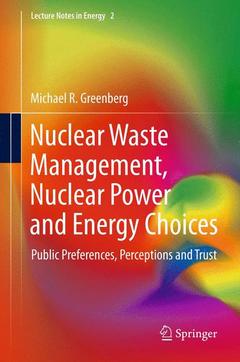Nuclear Waste Management, Nuclear Power, and Energy Choices, 2013 Public Preferences, Perceptions, and Trust Lecture Notes in Energy Series, Vol. 2

Hundreds of studies have investigated public perceptions and preferences about nuclear power, waste management, and technology. However there is clear lack of uniformity in the style, aims and methods applied. Consequently, the body of results is inconsistent and it is difficult to isolate relevant patterns or interpretations. Nuclear Waste Management, Nuclear Power and Energy Choices: Public Preferences, Perceptions and Trust presents a theoretical base for public reactions then classifies and reviews the large body of surveys carried out over the past decade.
Particular focus is placed on residents within 50 miles US nuclear waste facilities due to the disproportionate presence of nuclear factors in their lives such as the legacy of nuclear waste disposal and job dependency. The motivations and reasons for their views such as fear, attraction to the economic benefits, trust of site managers and federal agencies, cultural views, personal history, and demographic attributes of the people are also considered to provide a balanced and detailed overview. Nuclear Waste Management, Nuclear Power and Energy Choices: Public Preferences, Perceptions and Trust includes a comprehensive treatment of the theories and literature, and most important is grounded in surveys in 2005, 2008, 2009, 2010, and 2011 which includes questions considering the impact of Fukushima on US public opinion.
By including real life data alongside the analysis, Nuclear Waste Management, Nuclear Power, and Energy Choices: Public Preferences, Perceptions and Trust provides a relevant and concise reference for nuclear industry professionals. It also acts a resource for students and researchers studying nuclear-related topics including political, social and environmental factors.
Particular focus is placed on residents within 50 miles US nuclear waste facilities due to the disproportionate presence of nuclear factors in their lives such as the legacy of nuclear waste disposal and job dependency. The motivations and reasons for their views such as fear, attraction to the economic benefits, trust of site managers and federal agencies, cultural views, personal history, and demographic attributes of the people are also considered to provide a balanced and detailed overview. Nuclear Waste Management, Nuclear Power and Energy Choices: Public Preferences, Perceptions and Trust includes a comprehensive treatment of the theories and literature, and most important is grounded in surveys in 2005, 2008, 2009, 2010, and 2011 which includes questions considering the impact of Fukushima on US public opinion.
By including real life data alongside the analysis, Nuclear Waste Management, Nuclear Power, and Energy Choices: Public Preferences, Perceptions and Trust provides a relevant and concise reference for nuclear industry professionals. It also acts a resource for students and researchers studying nuclear-related topics including political, social and environmental factors.
Particular focus is placed on residents within 50 miles US nuclear waste facilities due to the disproportionate presence of nuclear factors in their lives such as the legacy of nuclear waste disposal and job dependency. The motivations and reasons for their views such as fear, attraction to the economic benefits, trust of site managers and federal agencies, cultural views, personal history, and demographic attributes of the people are also considered to provide a balanced and detailed overview. Nuclear Waste Management, Nuclear Power and Energy Choices: PublicPreferences, Perceptions and Trust includes a comprehensive treatment of the theories and literature, and most important is grounded in surveys in 2005, 2008, 2009, 2010, and 2011 which includes questions considering the impact of Fukushima on US public opinion.
By including real life data alongside the analysis, Nuclear Waste Management, Nuclear Power, and Energy Choices: Public Preferences, Perceptions and Trust provides a relevant and concise reference for nuclear industry professionals. It also acts a resource for students and researchers studying nuclear-related topics including political, social and environmental factors.
By including real life data alongside the analysis, Nuclear Waste Management, Nuclear Power, and Energy Choices: Public Preferences, Perceptions and Trust provides a relevant and concise reference for nuclear industry professionals. It also acts a resource for students and researchers studying nuclear-related topics including political, social and environmental factors.
By including real life data alongside the analysis, Nuclear Waste Management, Nuclear Power, and Energy Choices: Public Preferences, Perceptions and Trust provides a relevant and concise reference for nuclear industry professionals. It also acts a resource for students and researchers studying nuclear-related topics including political, social and environmental factors.
1. Managing the Nuclear Legacies.- 2. The United States Nuclear Factories.- 3. Public Stakeholders: What We Know and Expect.- 4. CRESP Surveys of Major US Department of Energy Environmental Management Site-Regions and of the National Population, 2005-2010.- 5 Impact of the Fukushima Events on Public Preferences and Perceptions in the United States, 2011.- 6. Nuclear Waste Management: Building a Foundation to Enhance Trust.
Michael Greenberg studies environmental health. He is professor and director of the Environmental Management and Communications Group of Rutgers University; director of the U.S. DHS-funded Center for Transportation Safety, Security and Risk at Rutgers University; and associate dean of the faculty of the Edward J. Bloustein School of Planning and Public Policy. In addition to more than 25 books, professor Greenberg has contributed more than 300 articles and 40 editorials to social science and policy journals and has written more than 200 technical reports. He has been a member of National Research Council Committees that focus on the destruction of the U.S. chemical weapons stockpile and nuclear weapons; chemical waste management; and the degradation of the U.S. government physical infrastructure. He has received awards for research from the United States Environmental Protection Agency, the Society for Professional Journalists, the Public Health Association, the Association of American Geographers, and Society for Risk Analysis. He serves as associate editor for environmental health for the American Journal of Public Health, and is editor-in-chief of Risk Analysis: An International Journal.
Date de parution : 09-2014
Ouvrage de 142 p.
15.5x23.5 cm
Date de parution : 08-2012
Ouvrage de 142 p.
15.5x23.5 cm



